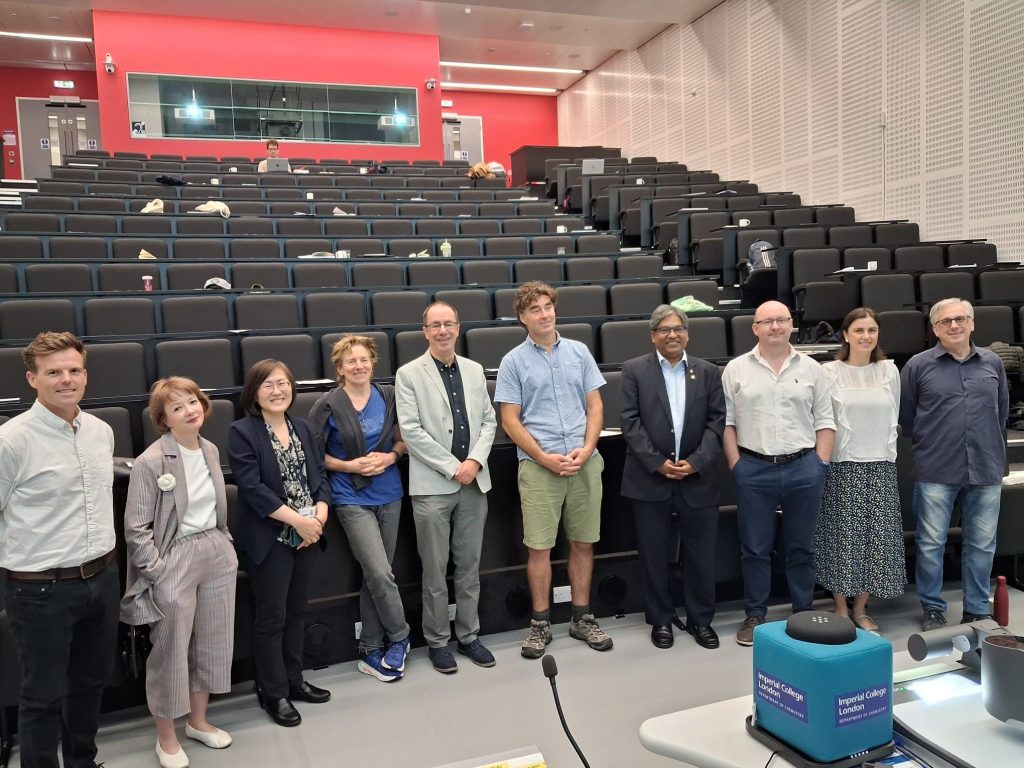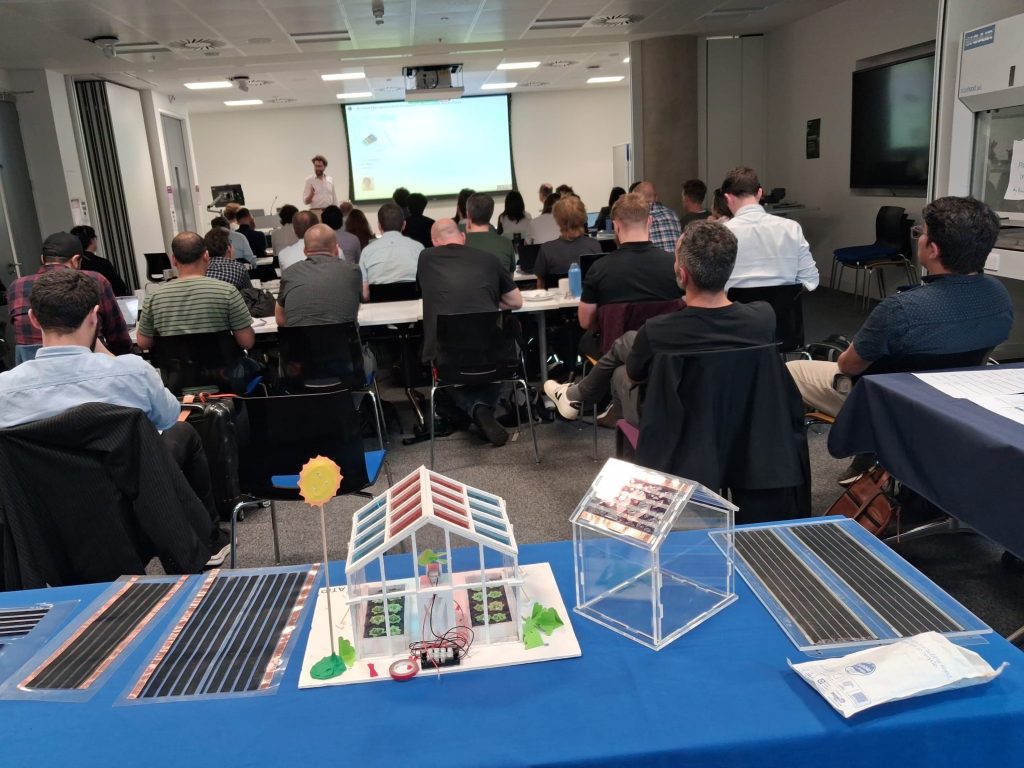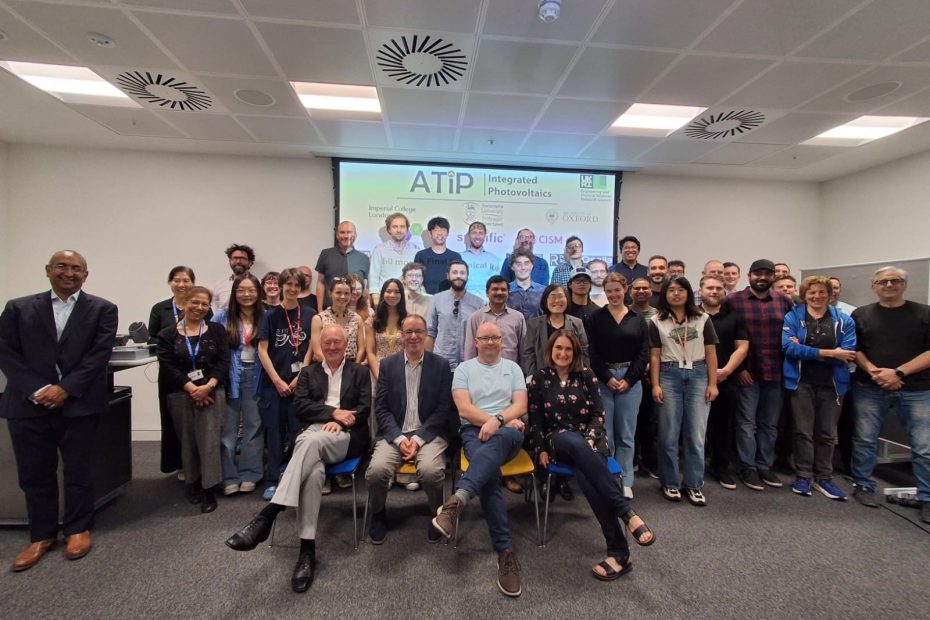This July 2025, we celebrate the successful conclusion of the ATIP Project, a rewarding five-year journey of innovation, collaboration and impact.
To mark the occasion, we hosted a two-day meeting at Imperial College London’s White City campus. The final meeting brought together project partners, collaborators, and stakeholders from across academia and industry. It was a very successful event with a positive vibe that captured the celebratory mood reflecting on everything we have accomplished throughout the project.
The first day kicked off with a Project Review Meeting, where each research group shared the highlights of their work. It was a great chance to see just how much ground we’ve covered and to spark some really interesting conversations. The collaborative spirit that’s been at the heart of ATIP was on full display.
Day two crowned our achievements as ATIP hosted an Open Symposium, with inspiring talks from external speakers such as Professor Ravi Silva, Professor Marina Freitag, Dr. Derya Baran, and Dr. Diego Bagnis alongside ATIP speakers. The presentations sparked conversations and ideas to take us beyond the ATIP project.
ATIP’s Successes
ATIP has delivered some astounding results:
- Scientific excellence: Over 200 peer-reviewed publications have emerged from the project, advancing the frontiers of our field, including multiple papers in high profile journals such as Science, Nature, Energy and Environment Science, Journal of the American Chemical Society and Advanced Materials.
- Innovation and impact: Two start-up companies Reef IoT and Printed PV are currently in progress, translating research into real-world applications.
- Career growth and progression: Team members are moving on to exciting roles in academia and industry. Jenny Baker, an original Co-Investigator, has been appointed to a Professorship at the University of Bath, where she now leads work on industrial decarbonisation and Ardalan Armin was appointed at Collins Aerospace as Senior MEMS Technologist.
- Community and leadership: ATIP has fostered a supportive, inclusive environment, and it has also played a key role in developing Early Career Researchers (ECRs). For example , Jiaying Wu moved to Hong Kong University of Science and Technology as Assistant Professor and Yifan Dong moved to NREL as PDRA and then to University of California Riverside as Assistant Professor.
One of the biggest wins from ATIP has been shaping the concept of Application Targeted Integrated Photovoltaics (ATIP). It’s now a recognised area in the research world, with its own sessions at major conferences such as MRS (Materials Research Society) and MATSUS (Materials for Sustainable Development) and growing interest globally.
ATIP explored new ways of designing PV for specific applications. The project delivered major advancements in two rapidly emerging application areas: Indoor PV and AgriPV, exploring the possibilities of using both OPV (organic PV) and perovskites technologies in each. ATIP helped establish a clear pathway for efficient energy harvesting in low-light environments, opening up new possibilities for powering IoT (Internet of Things) and smart devices. The project also had a major contribution towards establishing international indoor testing standards.
ATIP supported the development of an ultra-low power air control monitor sensor powered by organic / perovskite PV, which has received a European Product Design Award, with the commercial start up Reef IoT now in progress. Also, ATIP assisted the development of standardized protocols for Indoor PV testing and gain deeper understanding and consensus of light resource availability. Through targeted research and demonstration, ATIP contributed to the development of sustainable solutions that combine agriculture and solar energy, paving the way for further innovation in this space.
In addition to developing emerging applications, significant efforts have been dedicated to advancing the underlying scientific foundations, analyzing new material sets, and translating leading OPV/perovskite devices into scalable, roll-to-roll compatible, fully sustainable, and cost-effective manufacturing processes.
ATIP has significantly strengthened collaborations between academic institutions and 11 industrial partners. The engagement from industry has been exceptional, contributing not only resources but also strategic direction that helped shape the project’s success. The collaboration was very multidisciplinary, involving the universities of Swansea, Oxford, and Imperial College, alongside both established and emerging companies in the PV sector such as Polysolar, NSG, Oninn, and Power Roll.
The expertise in photovoltaics developed through ATIP is not only advancing science and innovation but also building domestic capability in next-generation PV technologies and helping to ensure the UK’s energy resilience and technological independence.
The project also had a strong impact through outreach activities, engaging with schools, communities, and the broader public. Examples of this include the Great Exhibition Road Festival, Swansea Science Festival and exhibition stands at conferences and trade shows.
While the ATIP Project officially concluded at the end of June, its legacy will endure. It has laid strong foundations for the future of UK next-generation PV research and innovation.
Statements from ATIP and its Collaborators
Diego Bagnis, Oninn:
“It has been more than a pleasure to take part in the ATIP project, which fostered a truly fruitful collaboration across institutions and disciplines — a testament to the strength of shared vision and scientific dedication. I’m proud to have contributed to pushing the boundaries of third-generation solar technology alongside such brilliant minds.”
Martyn Rush, Polysolar:
“The open and responsive approach created by ATIP is one where researchers, businesses and PV can thrive. By targeting applications through deep science, they’ve not only seen technological success but also forged a model for how academia and business can meaningfully inform one another. Polysolar takes pride in working with a core section of the UK PV capabilities”.
Silvia Villarroya Lidon, ATIP Project Manager:
“It has been a pleasure to see the growth and evolution of the program grant, which was launch in the middle of a global health pandemic. It has not only delivered important outcomes but also strengthened collaboration across partners, supported career development, and helped create a thriving research environment.”
Professor James Durrant, Principal Investigator for ATIP:
“The enthusiasm and dynamism of the ATIP community has made my role as project lead very rewarding and enjoyable. It’s an exciting time to work on solar energy conversion in general, and the emerging photovoltaics ATIP has focused on in particular. I am very grateful for all the support and hard of the ATIP community, and especially my co-lead Paul Meredith, and invaluable project manager Silvia Villarroya Lidon in making the ATIP project such a success.”
Blog written by Dr Silvia Villarroya Lidon.


